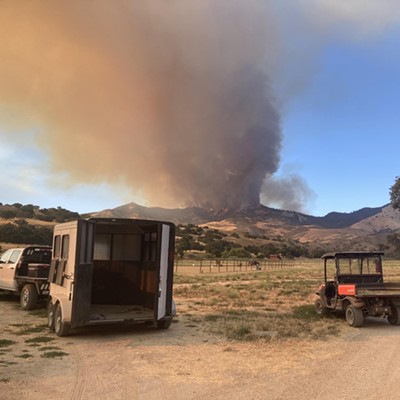New Year’s Day brought a slew of new laws for Californians to follow. Gov. Gavin Newsom signed 770 bills in 2021, which officially became laws on Jan. 1, 2022.
This week, the Sun sorted through the pile to highlight nine key laws that locals should look out for in 2022. From attempts to relieve the housing crunch, rein in law enforcement, and counter voter suppression tactics, these laws are likely to show up in the lives of Central Coast residents and affect local communities this year.
Universal vote-by-mail
Voting by mail is here to stay. After California tested out universal vote-by-mail during the COVID-19 pandemic—sending every registered voter a mail-in ballot—citizens responded by turning out in record numbers. While the practice quickly became divisive once former President Trump blamed mail-in voting for his election loss, many states, including California, leaned into the shift.
Assembly Bill 37 requires all county elections officials to deliver mail-in ballots to all registered voters ahead of future elections. The law overrides any local effort—like that of the San Luis Obispo County Board of Supervisors last year—to revert to a traditional election model built around polling places.
Slicing and dicing single-family lots

Of the many new laws passed to try to bring down statewide housing costs and boost housing production, Senate Bill 9 stood out as most controversial. The law gives property owners the ability to split their single-family lots into two and build up to two primary homes on each—effectively allowing for more density in traditional single-family neighborhoods.
Critics have decried the law as the “death of single-family zoning” and worry about the impact on neighborhoods, while proponents believe it will add to California’s housing stock and make home ownership more attainable.
Communities across the Central Coast will have to wait and see how the law plays out in their neighborhoods in 2022.
Police: think before you tear-gas
Assembly Bill 48 tries to rein in law enforcement’s ability to use nonlethal weapons, like tear gas, to control crowds—a tactic often resorted to during nationwide Black Lives Matter protests in 2020.
This new law prohibits the use of those weapons in situations where there’s “a violation of an imposed curfew, verbal threat, or noncompliance with a law enforcement directive.” Yet, tear gas is permitted in the face of “a threat to life or serious bodily injury” or “to bring an objectively dangerous and unlawful situation safely and effectively under control.”
“Objectively dangerous” was how SLO Police Chief Rick Scott described a June 2020 protest in the city that ended with protesters running away from tear gas, pepper balls, and flash bangs.
Scott claimed his department did not violate the letter or spirit of AB 48 when it used the weapons to end the protest, calling the gathering on Santa Rosa Street “no longer peaceful.” He said police used tear gas as “a last resort in defense of the safety of the officers and the protesters themselves.”
Decertifying bad cops
In another law aimed at police accountability, Senate Bill 2 enacts the state’s first decertification process for police officers who commit acts of misconduct, like sexual assault or excessive force.
The law creates a new division within the state’s Commission on Peace Officer Standards and Training, which will be tasked with investigating allegations of police misconduct.
If misconduct allegations are sustained, an advisory board can recommend punishments for the officer, including the revocation of his or her certification—which would mean that that officer couldn’t simply move on to a different police department.
To-go cocktails stick around
At first a desperate survival experiment during the early lockdowns of COVID-19, “to-go” alcoholic drinks are now a popular commodity at bars and restaurants—and will be permitted for at least another five years under a new state law.
Senate Bill 389 allows the food and drink industry to continue selling boozy beverages in a to-go fashion—as long as the customers pick up their drinks and also order a full meal. That last condition has rankled some business owners who say it favors restaurants and discriminates against bars and other drink-focused establishments.
Compost or else
Six years ago, Gov. Jerry Brown signed Senate Bill 1383—setting into motion an aggressive timetable for California to reduce its methane emissions caused by organic waste in landfills.
On Jan. 1, many of the regulations associated with the law kick in. Residents and businesses alike will grapple with new requirements for composting and food rescue.
The rules are all geared toward reducing how much organic waste winds up in landfills by 75 percent.
‘Stealthing’ is sexual battery
California is the first state in the U.S. to legally ban “stealthing”—the act of removing a condom without a partner’s consent during sex.
Assembly Bill 453 adds stealthing to the state’s civil definition of sexual battery—giving victims the opportunity to sue their violators if they wish.
The law was crafted in response to several recent studies showing stealthing’s increasing prevalence. The act puts victims at risk of STIs and unwanted pregnancies.
Freer pigs, higher prices?
Bacon may get more expensive this year, as the U.S. meat industry grapples with the rollout of Proposition 12.
This 2018 ballot initiative set minimum space requirements for confining farm animals like pigs, calves, and chickens. While those animals will soon have a legal right to luxuries like “turning around” and “fully extending their limbs,” the meat industry will likely see its cost of doing business go up as a result.
SLO County Farm Bureau Executive Director Brent Burchett told the Sun that he “wouldn’t rule out” a 10 percent increase in pork prices in the coming months thanks to Proposition 12—a tough pill to swallow for consumers already feeling the crunch of inflation, he said.
Minimum wage hits $15
Workers earning minimum wage on the Central Coast will get another bump this year.
Those employed at businesses with 26 or more employees will now earn at least $15 per hour. That’s the final minimum wage increase in a schedule of wages established by state law in 2017, which started at $10.50 per hour.
For workers at smaller companies with 25 or fewer employees, they’ll have to wait another year to get $15. Their wage increased from $13 to $14 on Jan. 1, with a final $1 bump scheduled for 2023.
Contact Peter Johnson, the assistant editor of the Sun’s sister paper, New Times, at [email protected].












